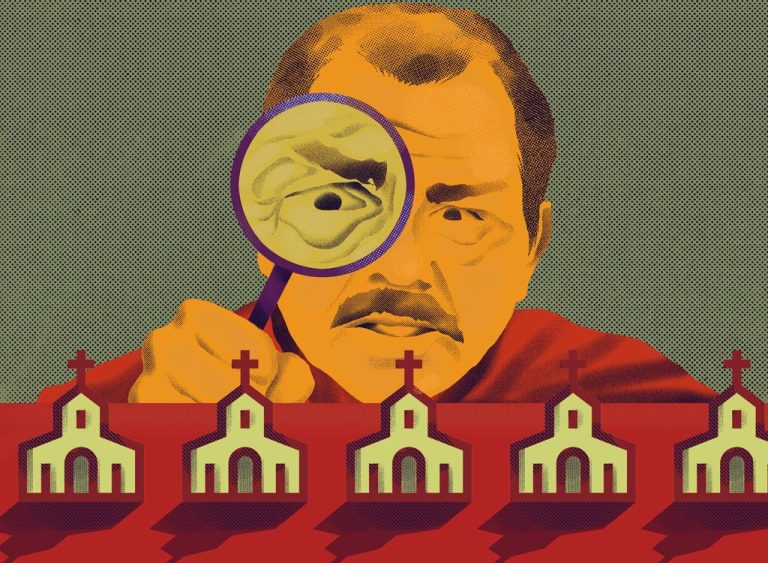3 de agosto 2023

“NicaraguAmor” Cultural Caravan for Nicaraguans in the USA

PUBLICIDAD 1M
PUBLICIDAD 4D
PUBLICIDAD 5D
Priests and Church parishioners remain true to their faith, despite surveillance in parishes and the banishment or exile of over 80 religious leaders

Illustration: Confidencial
The persecution the Ortega regime has maintained against the Catholic Church in Nicaragua has provoked the “forced abandonment” of dozens of parish churches. The priests leave the country to safeguard their life and liberty. If they remain in their towns, “they may go to sleep and not wake up, due to the political persecution,” assures Father “Carlos” [assumed name], who was denied reentry into his own country.
In the last five years, at least eighty male and female religious figures have been banished or forced to flee Nicaragua – most of them in the last year and a half. That number includes nearly fifty Catholic priests, over thirty of them from either the Matagalpa diocese or the Managua Archdiocese.
The majority of the priests who were forced to go into exile or were banished, first suffered harassment and persecution in their parishes. However, in many instances that same harassment of the parishes and rectories continued, even after the priest left. In these parishes, the clandestine surveillance during Mass also persists, at the hands of plainclothes police agents or members of the paramilitary. This situation was confirmed through testimony offered Confidencial by a number of worshippers and religious leaders in different parts of Nicaragua.
Father Carlos assures: “the watchfulness is always there.” Meanwhile, Father Pablo, a parish priest exiled in 2022, adds: “the threats continue” with the objective of making sure the priests “stay quiet.”
When a priest is forced to go into exile, or is prevented from re-entering the country, a “parish council” meets and talks with the bishop of the diocese to make sure the parish Church isn’t left without a priest. The bishop then delegates priests from other parishes to organize the celebration of the most important Masses of the week – Thursday, in honor of the Blessed Sacrament, and Sunday. The congregation of the affected church must then wait six months for the bishop to appoint a new parish priest.
“The bishop coordinates with the closest priests, to care for the parish. Parishes are always attended. The problem is – when one priest, then another priest, leaves… [in that case] there’ll be priests who have to take charge of one or two parishes now,” explains Father Carlos.
When Father Carlos’ parishioners found out that he couldn’t return, they called him to express their solidarity in the face of the arbitrary action taken against him. Some confessed that just communicating with him made them fearful. “It’s logical,” says the priest, “since the dictatorship wants to cut off all types of contact between the people and their priests.”
Attorney Martha Patricia Molina, who has documented the government aggression against the Catholic Church, comments that the Police have also changed their method of laying siege to the Catholic Churches. That doesn’t mean, she adds, that the harassment has diminished.
“The police aren’t using their uniforms to keep watch, but the siege continues permanently. The lay leaders and priests can clearly recognize those churchgoers who are paramilitary, members of the “Citizen Power Councils” [neighborhood groups organized by the Sandinista regime], or police, who don’t arrive in uniform in order not to draw attention,” the attorney remarks.
In August 2022, the dictatorship of Daniel Ortega escalated the repression against the Catholic Church. The assault began with a police siege of the Matagalpa Curia, preventing Monsignor Rolando Alvarez- the bishop of Matagalpa – from leaving the building, where he was virtually held under house arrest. The prelate’s collaborators, who accompanied him at the time of the police operation, were imprisoned there with him.
From that moment on, some eight parishes in the Matagalpa dioceses were also subjected to a police siege. Police patrol cars parked in front of these houses of worship and took pictures of the faithful. The heads of police also issued direct threats to the parish priests, warning them not to refer to the attacks against the Church in their homilies.
A Confidencial data review estimates that some16 priests from the Matagalpa dioceses have been expelled from the country or have had to go into exile due to the police persecution, mostly in the past year.
Following the departure of their priest, a sense of calm slowly returned to some of the parishes that were under constant police watch. In these places, the congregation continues attending Mass and maintaining their prayer groups. However, according to some of those worshippers, that “calm” is only “in appearance.”
“There’s always an imminent threat of siege in Matagalpa,” believes “Julia,” a member of the congregation of the San Pedro Cathedral. She asserts that although the police presence around the temples has diminished, they’re always under political watch. For that reason, many avoid comments about the imprisonment of their bishop, especially on social media.
In February 2023, the Ortega dictatorship mounted a lightening trial in which they sentenced Bishop Alvarez to over 26 years in prison for fabricated crimes. More recently, the regime froze the bank accounts and pensions of retired priests. A half dozen priests are also serving prison sentences for common crimes, or are under de facto house arrest due to supposed investigations of money laundering the dictatorship has accused the Church and its priests of engaging in.
The terror that the dictatorship of Daniel Ortega and Rosario Murillo have imposed against the Catholic Church has affected some of the faithful. Some, as an extreme measure, stopped congregating in their parish communities for fear of reprisals. Others opted to meet in small groups, but in private houses instead of the church.
“Carmen,” who attends a church in the North of Nicaragua, stresses that despite the assault of the Ortega regime, the faithful “aren’t going to leave our priests all alone.”
The church that Carmen attends was one of those affected by the restrictive measures of Nicaraguan Immigration some months ago, when they blocked the priest from reentering the country. “It had a great impact on everyone and was a very sad thing, because he’s a very beloved priest,” she shares.
Be it exile or banishment, having to leave the country by force also impacts the priests personally. “It’s a forced exile. I want to be in my own land. We all want to be in our land, working in our home for our people. Our family,” declares Father Carlos. The priest adds: “Everything we’re experiencing now is part of a political situation of a regime that wants to silence the Church. And that’s something that they’ll never be able to achieve.”
This article was originally published in Spanish in Confidencial and translated by Havana Times

PUBLICIDAD 3M
Confidencial es un diario digital nicaragüense, de formato multimedia, fundado por Carlos F. Chamorro en junio de 1996. Inició como un semanario impreso y hoy es un medio de referencia regional con información, análisis, entrevistas, perfiles, reportajes e investigaciones sobre Nicaragua, informando desde el exilio por la persecución política de la dictadura de Daniel Ortega y Rosario Murillo.
PUBLICIDAD 3D